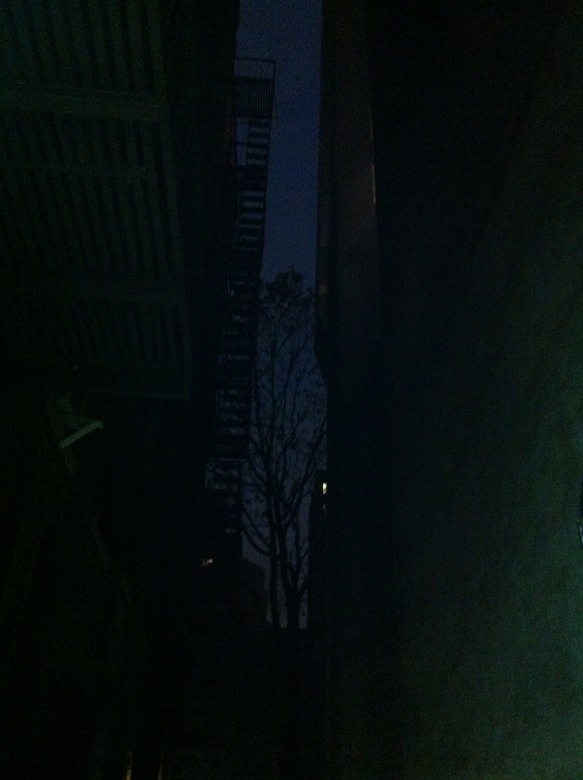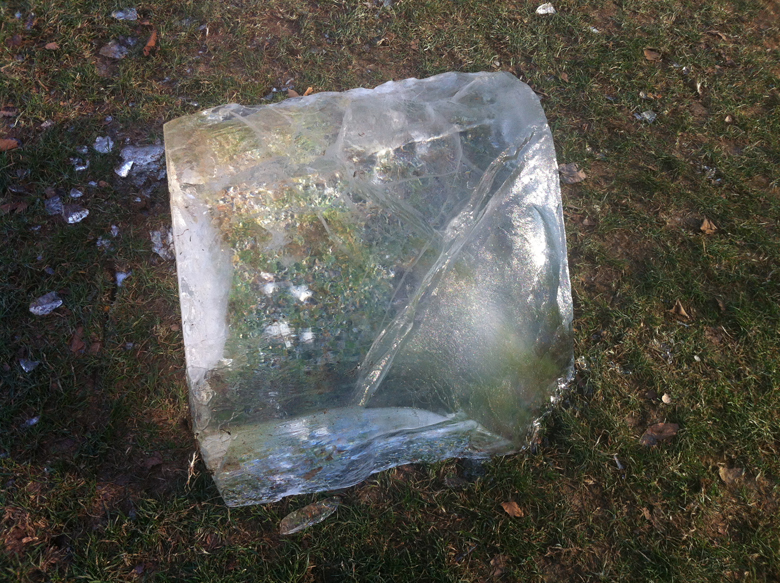CXXIV
Swaying and droning in the wind, shimmering with the brilliance of its metal battens, the [Eiffel] tower forges ahead; only the soft friable ground slows its steps. Though the runaway knows clearly whence it comes, it scarcely knows where it is going: chance propels it northwest, straight into the sea. The steel behemoth wants to turn back – but what’s this? Cannons ranged in a semicircle ready to fire. High-explosive shells attempt to bar its way; humming beneath their hits, the steel breaks through the first ring and, scattering cannons, storms north: to the formidable fortification walls of Antwerp. Batteries thunder: steel clashes against steel. Reeling from the hits, rocking on its lacerated joints, the tower screams out in an iron voice and staggers around to the southeast. Like a wild beast driven back into its cage with whips, the tower is ready to return and dig its feet back into the square people have assigned it. But just then it hears, from far away in the east, a barely audible radio call: “This way, this way!”
You and I, of course, know who was calling the lost tower and from where. And now it knows where to go: due east. The revolutionary will join the revolutionaries. From capital to capital the wires hum with fright: “The mad rogue has been Bolshevized,” “Stop the tower!” [from Sigizmund Krzhizhanovsky, “The Bookmark,” Memories of the Future, c. 1925,Joanne Turnbull, trans. New York: NYRB, 2009]
Sunday 4 November
The Admiral showed cinnamon and pepper to a few of the Indians of that place (it seems from the samples that he was bringing from Castile) and he says that they recognized it; and they said by signs that nearby to the southeast there was a lot of it. He showed them gold and pearls, and certain old men answered that in a place that they called Bohio there was a vast amount and that they wore it on neck and in ears and on arms and legs; and also pearls. Moreover, he understood that they said that there were big ships and much trade and that all of this was to the southeast. He understood also that, far from there, there were one-eyed men, and others, with snouts of dogs, who ate men, and that as soon as one was taken they cut his throat and drank his blood and cut off his genitals. The Admiral decided to return to the ship to… decide whether to leave and seek those lands…
Tuesday 6 November
…They saw many kinds of trees and plants and fragrant flowers; they saw birds of many kinds, different from those of Spain, except partridges and nightingales, which sang, and geese, for of these there are a great many there. Four-footed beasts they did not see, except dogs that did not bark. The earth was very fertile and planted with those manes and bean varieties very different from ours, and with that same millet. And they saw a large quantity of cotton collected and spun and worked; and in a single house they had seen more than five hundred arrobas; and that one might get there each year four thousand quintales. The Admiral says that it seemed to him that they did not sow it and that it produces fruit [i.e., cotton] all year. It is very fine and has a large boll. Everything that those people have, he says, they would give for a very paltry price, and that they would give a large basket of cotton for the tip of a lacing or anything else given to them. They are people, says the Admiral, quite lacking in evil and not warlike; all of them, men and women naked as their mothers bore them. It is true that the women wear a thing of cotton only so big as to cover their genitals and no more. And they are very respectful and not very black, less so than Canarians. I truly believe, most Serene Princes (the Admiral says here), that, given devout religious persons knowing thoroughly the language that they use, soon all of them would become Christian… [from the 1492 Journal of Christopher Columbus]
A good judge of volumes is not necessarily a book reviewer
See me and Elisha down by the schoolyard
Absorbed in listening, I hadn’t noticed the gathering dusk. The air, now cool, rocked between the buildings: leaves twitched, dust swirled along the paths, and from somewhere – from the building site, most likely – a wood shaving skittered toward our bench: swiftly turning, it cavorted across the boulevard and came to rest a few steps away. I noticed the intent look on the theme catcher’s face as he turned the feathery, loosely curled shaving over in his hand. He gazed at it affectionately, squinting.
“Well now, and this too. Why if you straighten out its curls and look hard, there’s substance enough for a short story, some ten pages. And no need to hunt for a title: ‘The Shaving.’ There. Then ever so carefully – spiral by spiral – something like this: a carpenter, a young fellow by the name of, say Vaska Tyankov. He knows and loves his trade. With his ax and his plane, he will do wonders – and gladly. But the countryside is poor and work hard to come by, so Vaska Tyankov goes to the city from time to time to earn his bread. With Vaska, in his beloved wooden chest, go his chisels, ax and planes, while from there, hidden under his tools, come stowaway bundles of leaflets and proclamations. Meetings in the city take up more and more of his leisure. Events follow events. February – July – October. The Party comes out from underground, seizes power. Carpenter Vaska, long known as comrade Vasily, swaps his padlocked box of tools for a bulging briefcase fitted with a steel clasp. He’s up to his ears in work: automobiles convey comrade Vasily from conference to conference, typewrites tap, telephones yap: ‘Rush’ – ‘Priority’ – Urgent.’ Comrade Vasily’s eyelids are puffy with sleeplessness, a pencil permanently attached to one hand…” [Krzhizhanovsky, op. cit.]
Running with dwarves
Form swallows function
He nodded with sudden delight and, taking my hand shook it warmly. I’ve noticed this before: people who live outside of things, surrounded by formulas and phantasms, are adverse to the usual gradualness, they befriend one and reject one immediately and completely. [Krzhizhanovsky, op. cit.]
Donny the Quix and his wonder horse Rosie
And upon this charge cry: golferarri, inlandancendgorge!
I was a Rocinante for the Quixotic Bureau of Information
“…reports, resolutions, congresses, official missions, urgent summonses. Only rarely – and timidly, dimly at that – do his dreams evoke the smoke rising over low log houses, the ripe rustling rye – and again the click-click open and shut of his briefcase, ‘have heard…have decreed,’ and the pencil in hand.
“Then one day – the most ordinary ‘one day’ imaginable – yet another telephone call forces Tyankov out of his bed and into his boots. Shoving his briefcase under his elbow, he dashes down the stairs. Outside the car is hooting. He kicks open the front door – and what does he see coming toward him, buffeted by puffs of wind, but this light shaving, curly as a ringlet and fragrant with resin. Tyankov glances about: no one (the driver is fussing with the tire cover). Then he quickly bends down and slips the feathery whorl into his briefcase. The tire cover is pulled on, the door slams shut and the automobile cuts through his meetings, from entrance to entrance, Report, dissenting opinion…” [Krzhizhanovsky, op. cit.]
Tales of poaching and corruption at the Wildebeest Gallery
You discover that you are logos intolerant
While others are lachrymose intolerant, wackoes intolerant, locos intolerant…
You’re practicing Ba Gua on 22nd Street. A hefty fellow in working clothes comes into your peripheral vision. As he passes, Hey, Sensai, whassup?
The seventh seal of the seventh seal
Tongue in sheep
Swingin’ wit da chimpz
I was all possible heavens and earths for the FBI
“…Another report. Someone with a slew of numbers. Tyankov wants to trump those numbers with his own. He opens his briefcase and scrabbles for the folders, but here – again – is that soft lock of a shaving. The joints of his fingers sing with a familiar sensation: between thumb and index – the plane’s oblique projection, and slowly curling over his hand – the rustling ringlets, fragrant with wood and resin. Comrade Vasily is about to pull his hand back, but too late a stippling of warm shots ripples along the nerves from this fingers to his brain, in his ear an invisible workbench creaks, under his elbow a rough board rocks, his hand is suddenly alive with the old carpenter’s reflex. Government official Tyankov tries – you understand – to pick up his pencil, but his hand refuses and demands its due. The tenacious shaving is already wrapped around his finger like a wedding ring; now not just his hand, but his entire arm, shoulder, body, tightening and tensing, are calling for the old work that was in their blood and muscles and from which they were forcibly parted…” [Krzhizhanovsky, op. cit.]
Again, Krzhizhanovsky:
We walked on, elbow to elbow, along the broad outlying streets. Soon we saw the smooth parallels of tram tracks coming toward us. And hard by my shoulder I heard the quiet remark: “If parallels converge in infinity, then all trains that disappear into infinity must, at the convergence, meet with disaster.”
We walked two or three blocks without exchanging another word. I was plunged in my thoughts when my companion’s sudden voice made me start. “If I haven’t worn you out completely I’d like to tell you my last theme. I’ve often wanted to write it down, but I’m afraid I’d spoil it. It’s not long, it won’t take ten minutes; or perhaps I shouldn’t?”
With a shy smile, he looked at me almost pleadingly.
“No, by all means.”
And the story began.


